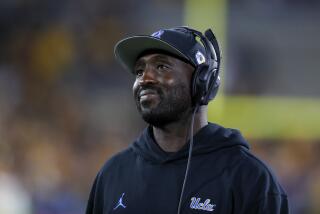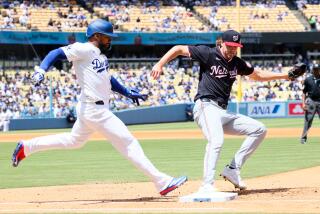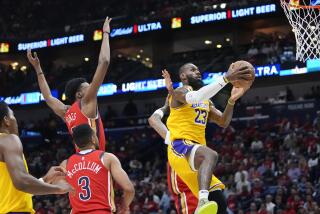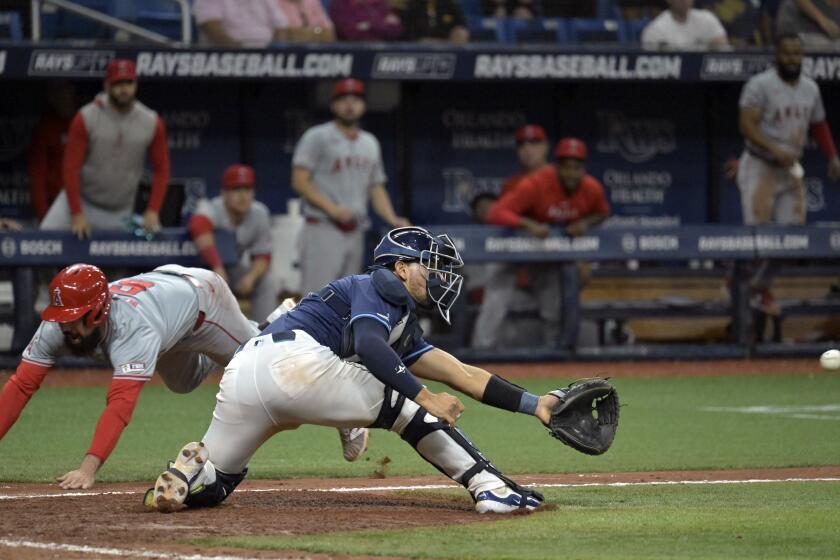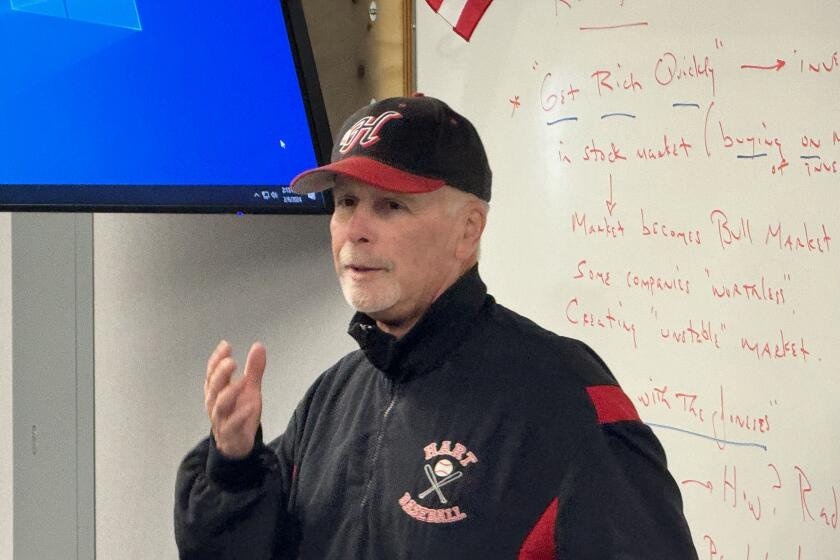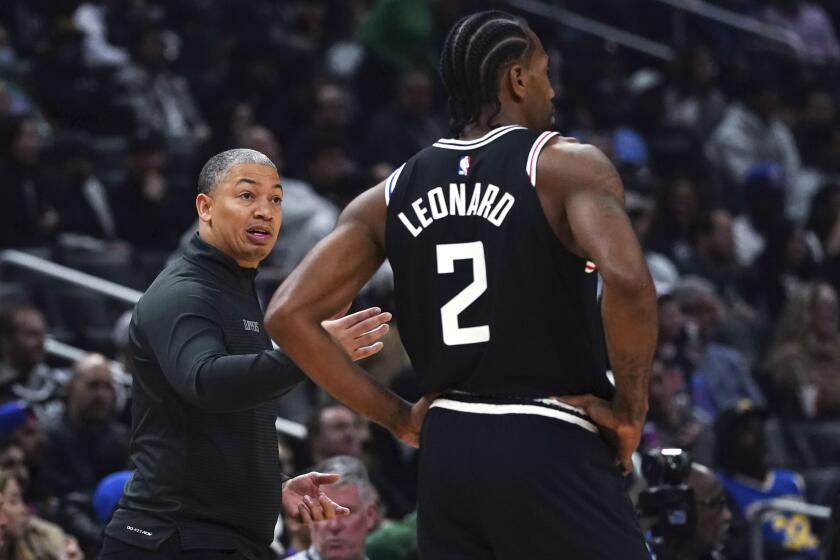Full-Speed Ahead : Schumacher Leads Aggressive Generation of Formula One Drivers
At 25, Michael Schumacher is on track to become Formula One motor racing’s youngest world champion and Germany’s first. He is heading into Sunday’s Belgian Grand Prix with a 31-point lead over his closest rival, Damon Hill of Williams Renault, and almost a home-court advantage on his favorite circuit, the one that launched his spectacular career.
The Michael Schumacher fan club has laid claim to an entire dell near the Spa-Francorchamps circuit with campers, lawn furniture and German flags.
Inside, the Benetton Ford quarters smell like success--or is that the flowers on the hospitality tables? German, Italian and British reporters trade kisses on both cheeks with Schumacher’s stylish press aide, sip cappuccino and wait for the man they herald as Ayrton Senna’s heir.
But Schumacher isn’t having any premature talk about the championship. He looks as far into the future as the next race and will not be blinded by a promise of victory. That could only derail his nearly palpable concentration, his firm sense of discipline.
“I am not world champion now and as long as there is a theoretical chance not to be world champion, I will not think I am world champion,” he said. “This is one part of my discipline which has always kept me on the ground.”
Schumacher has a deep tan that sets off his green eyes and sandy hair. Dressed in jeans and a suede jacket, he looks remarkably relaxed amid the controversies and tragedy surrounding this year’s competition--including the death of his idol, Senna, a personal loss and a reminder after 12 fatality-free years that this is, after all, a dangerous sport.
Then came the suspension over missing a black-flag penalty at Silverstone during the British Grand Prix, which the team is appealing. If Schumacher loses the hearing next week, as is likely, he will sit out the grand prixes of Italy and Portugal.
In July, the sport’s ruling body, FIA, also announced that an investigation of electronic drivers’ aids banned last year had turned up a launch control in Benetton’s car. The organization could not prove the Benetton team had used the software, and other teams have since acknowledged that they also left some of the illegal aids in their systems, but do not use them. All now must be out by the Italian Grand Prix.
Finally, there was the flash fire that engulfed Schumacher’s teammate, Dutchman Jos Verstappen, during the German Grand Prix at Hockenheim in July. The FIA has accused Benetton of illegally removing a gas filter and Benetton faces suspension if the FIA finds against the team at a hearing in October.
Schumacher does not want to discuss these unpleasant subjects, either. Why talk about penalties that might not happen? He has told the German news magazine Focus that it would be unacceptable if it turned out that the team removed the filter without permission from the FIA and that the missing filter caused the fire.
But what does that mean? Would he leave Benetton?
“There’s no need to discuss this at the moment,” he said. “It’s not proven in one direction or the other.”
At the mention of Senna’s name he clams up again.
“I had strong feelings for Ayrton. He has been my idol,” he said. “I just can’t forget what happened. It’s hard for me to go through all the feelings again. That’s why I don’t want to talk too much about it.”
But was he robbed by the tragedy of a chance to prove himself against the best?
“It’s not that I was robbed,” he said. “It’s a shame Ayrton did not have the opportunity to drive the championship through to the end. . . . On the circuit, there’s still competition going on. I would say good competition. Certainly not as good as it was before.”
It is apparent that Schumacher’s relaxed demeanor is part of his discipline. He works at putting these issues out of his mind, out of the way of his driving. He is dressed casually, but on closer inspection his casual leather shoes and belt and jacket look beautifully put together and he seems, well, intensely calm, if that is possible. He is cool, deliberate in choosing his words, very polite.
Perhaps this is Schumacher’s guard against early fame and success, for which he says he was completely unprepared. He knows that he cannot allow himself to be thrown off course by the money and glamour, or by controversy.
Schumacher grew up in Kerpen, near Cologne, the son of a mason who encouraged him in Go-Kart racing, but who could not afford to finance Formula racing. Schumacher says he was “lucky to have had very basic parents” with whom he enjoyed a good relationship--one he credits with keeping him on an even keel today.
He graduated from karting to Formula Ford single-seat cars to Formula Three racing at the end of the 1980s, with financial help from sponsors. In 1990, he won the German Formula Three championship and then surprised racing observers by signing with the Sauber-Mercedes sports car team.
A year later, Schumacher burst into Formula One at the Belgian Grand Prix when the Jordan team picked him to sit in for their regular driver, Bertrand Gachot, and he qualified a surprising seventh.
Benetton grabbed him, and the next year he won his first race at Spa. This year he has won seven of the first 10 races in a 16-race season, leading a new, younger generation of drivers who are slightly more aggressive than their more experienced predecessors.
Other teams are skeptical of Schumacher’s meteoric rise.
“We all know that Benetton is cheating the whole time,” Frank Williams, chief of the Williams Renault team was quoted as saying in Stern, the German weekly magazine.
Benetton team manager Joan Villadelprat responds that others are jealous. Schumacher attributes his success to discipline. Fitness is the key to his concentration, he says. He works out five days a week in the winter, three or four in the summer, keeps a tough regimen of cycling for the heart, muscle exercises for the neck and back to hold his head around high-mach corners, and stretching. He eats healthy food, feels guilty over an occasional wurst and pommes frites, and sleeps eight to 10 hours a day.
“I have always wanted to be more fit than necessary . . . for any circumstances,” he said. “I didn’t want to be fit just through the end of the race. I wanted to be fit even if I had the flu, if I’m under pressure and need more concentration than under normal times. I think that’s why under tough moments, I perform normally and don’t have the break people expect.”
Disciplined in work and determined to relax. Balance is crucial.
“I think it’s very important that you don’t lose the normal things,” he said. “And if you suddenly can’t enjoy yourself with the normal things, just looking at the sky and seeing the moon or the stars, then I think you have a problem.”
So Schumacher walks his dog and spends time alone with his fiancee, Corinna Betsch. He lived in Germany until the fans and publicity overwhelmed him. After one autograph-seeker barged into his living room through a terrace door while he was watching television, he moved to Monaco.
“So many famous people live there that when I went there, I wasn’t a famous person,” he said. “It’s changing a little now, but not in a way that upsets me.”
He wasn’t looking for fame and was not terribly happy with it at first.
“I had to get used to it, cope with it,” he said. “It was a tough time. But there came a time when I had to decide, either I get used to it or I have to stop doing it. Because I love the sport so much, I had to get used to it and even find some excitement from it.”
This is part of the maturing of Schumacher that his teammates describe. Team manager Villadelprat, a veteran in the business, says that Schumacher has grown enormously in the three years he has been on the team.
“You can have fast drivers who make a lot of mistakes, who are unhappy to be second when maybe that’s all they need to win the championship,” he said. “Michael realizes it’s more important to win the championship than the race.”
He likens him to Senna in his interest in the technical side of the sport, and in his cleverness.
“He’s clever enough to wait for the right moment to pass and has the speed of a young kid,” Villadelprat said. “He’s the type of driver who doesn’t take too long to go fast. One lap and he’s in the times.”
In public, Schumacher is careful, diplomatic. Asked about the change from Ford to Renault engines announced this week for next season, he tries to thank his winning Ford team while embracing the obviously better Renault. But Villadelprat says that the driver lets his hair down with his teammates, happily joining them for drink at a team party.
“He lives with us, works with us. He’s there to do a job and we’re there to do a job,” Villadelprat said. “The only way to go 100 kilometers (per hour) on a corner is if you feel everyone is behind you. Michael’s one of the boys.”
More to Read
Get our high school sports newsletter
Prep Rally is devoted to the SoCal high school sports experience, bringing you scores, stories and a behind-the-scenes look at what makes prep sports so popular.
You may occasionally receive promotional content from the Los Angeles Times.
